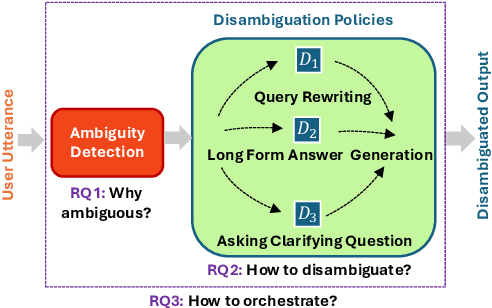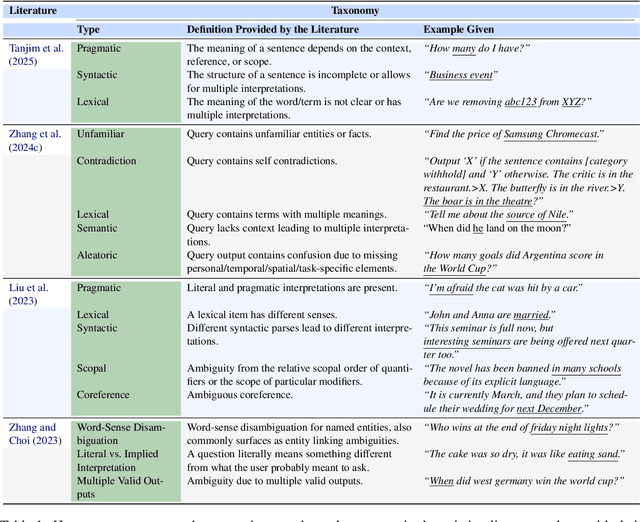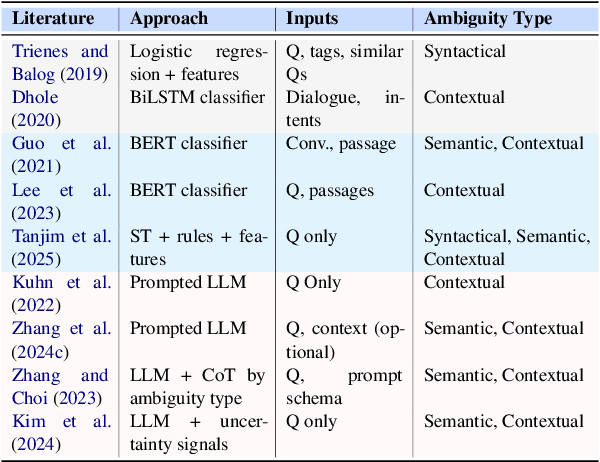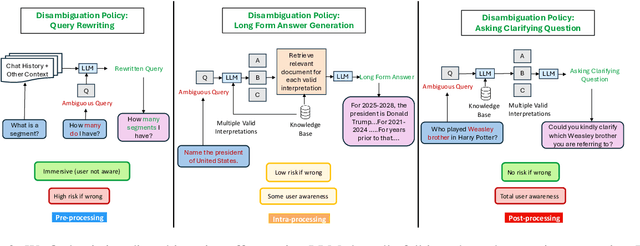Vaishnavi Muppala
Disambiguation in Conversational Question Answering in the Era of LLM: A Survey
May 18, 2025



Abstract:Ambiguity remains a fundamental challenge in Natural Language Processing (NLP) due to the inherent complexity and flexibility of human language. With the advent of Large Language Models (LLMs), addressing ambiguity has become even more critical due to their expanded capabilities and applications. In the context of Conversational Question Answering (CQA), this paper explores the definition, forms, and implications of ambiguity for language driven systems, particularly in the context of LLMs. We define key terms and concepts, categorize various disambiguation approaches enabled by LLMs, and provide a comparative analysis of their advantages and disadvantages. We also explore publicly available datasets for benchmarking ambiguity detection and resolution techniques and highlight their relevance for ongoing research. Finally, we identify open problems and future research directions, proposing areas for further investigation. By offering a comprehensive review of current research on ambiguities and disambiguation with LLMs, we aim to contribute to the development of more robust and reliable language systems.
ECLAIR: Enhanced Clarification for Interactive Responses
Mar 19, 2025



Abstract:We present ECLAIR (Enhanced CLArification for Interactive Responses), a novel unified and end-to-end framework for interactive disambiguation in enterprise AI assistants. ECLAIR generates clarification questions for ambiguous user queries and resolves ambiguity based on the user's response.We introduce a generalized architecture capable of integrating ambiguity information from multiple downstream agents, enhancing context-awareness in resolving ambiguities and allowing enterprise specific definition of agents. We further define agents within our system that provide domain-specific grounding information. We conduct experiments comparing ECLAIR to few-shot prompting techniques and demonstrate ECLAIR's superior performance in clarification question generation and ambiguity resolution.
Exploring Rewriting Approaches for Different Conversational Tasks
Feb 26, 2025



Abstract:Conversational assistants often require a question rewriting algorithm that leverages a subset of past interactions to provide a more meaningful (accurate) answer to the user's question or request. However, the exact rewriting approach may often depend on the use case and application-specific tasks supported by the conversational assistant, among other constraints. In this paper, we systematically investigate two different approaches, denoted as rewriting and fusion, on two fundamentally different generation tasks, including a text-to-text generation task and a multimodal generative task that takes as input text and generates a visualization or data table that answers the user's question. Our results indicate that the specific rewriting or fusion approach highly depends on the underlying use case and generative task. In particular, we find that for a conversational question-answering assistant, the query rewriting approach performs best, whereas for a data analysis assistant that generates visualizations and data tables based on the user's conversation with the assistant, the fusion approach works best. Notably, we explore two datasets for the data analysis assistant use case, for short and long conversations, and we find that query fusion always performs better, whereas for the conversational text-based question-answering, the query rewrite approach performs best.
 Add to Chrome
Add to Chrome Add to Firefox
Add to Firefox Add to Edge
Add to Edge